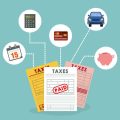Introduction to Personal Debt in the UK
Let’s face it, managing money can be a real challenge, especially these days. In the UK, personal debt has become a big talking point for a lot of people – from young adults just starting out to families juggling bills and older folks on fixed incomes. With the cost of living rising and unexpected expenses popping up left and right, more and more people are finding themselves struggling to keep up with repayments or even just cover their essentials. That’s why government support and schemes have become such an important safety net. These aren’t just buzzwords; they’re real lifelines for anyone feeling overwhelmed by debt. Whether it’s help with budgeting, advice on repayments, or actual financial assistance, understanding what’s out there could make all the difference when things start to feel a bit too much.
2. Government-Backed Debt Management Schemes
When you’re feeling overwhelmed by personal debt in the UK, it’s good to know that there are several government-backed schemes designed to help you get back on track. These official debt solutions offer structured ways to manage what you owe and can provide some much-needed breathing space. Here’s a quick rundown of the main options: Debt Management Plans (DMPs), Individual Voluntary Arrangements (IVAs), and Debt Relief Orders (DROs). Each scheme has its own features and eligibility criteria, so let’s break them down for you in the table below.
| Scheme | What It Is | Who Its For | Main Features |
|---|---|---|---|
| Debt Management Plan (DMP) | An informal agreement with your creditors to pay back non-priority debts at a manageable rate. | People with multiple non-priority debts (like credit cards or loans) who can afford some repayment each month. | – Not legally binding – Monthly payments based on what you can afford – Interest and charges may be frozen if creditors agree |
| Individual Voluntary Arrangement (IVA) | A formal, legally binding agreement to pay off part of your debts over an agreed period, usually five years. | Those with larger debts and some disposable income, but struggling to meet repayments. | – Legally binding – Creditors can’t chase you during the IVA – Some debt written off at the end |
| Debt Relief Order (DRO) | A way to have your debts written off if you have little income, few assets, and less than £30,000 of debt. | People with low income, minimal assets, and no realistic way to repay their debts. | – Lasts 12 months – Debts usually wiped out after a year – Low cost compared to bankruptcy |
Each scheme is managed by approved organisations or insolvency practitioners, so it’s important to get independent advice before choosing one. Don’t worry—there’s plenty of free help out there from charities like StepChange or National Debtline. In the next sections, I’ll share more details about how these schemes work day-to-day and what you need to think about before deciding which route might be best for you.
![]()
3. How to Access Support Services
If you’re feeling overwhelmed by personal debt in the UK, don’t worry—you’re not alone, and there are lots of helpful resources out there! Here’s a simple step-by-step guide to finding the right support services for your situation.
Step 1: Recognise When You Need Help
The first step is admitting that managing debt on your own feels tough. If you’re missing payments or struggling to keep up with bills, it’s definitely time to reach out for advice. There’s no shame in seeking support—most people need a helping hand at some point!
Step 2: Find a Trusted Organisation
There are several reputable organisations in the UK dedicated to helping people manage personal debt. Two of the best-known are Citizens Advice and StepChange Debt Charity. Both offer free, confidential advice tailored to your needs.
Citizens Advice
This well-established charity provides impartial guidance on a range of financial issues, including debt management. You can visit their website, use their online chat, call their helpline, or pop into your local Citizens Advice office for a face-to-face chat.
StepChange Debt Charity
StepChange offers free expert debt advice online and over the phone. They’ll help you create a personalised action plan—whether that means setting up a Debt Management Plan (DMP), exploring other government-backed schemes, or simply getting some budgeting tips.
Step 3: Gather Your Financial Information
Before contacting any organisation, it’s helpful to have details about your income, expenses, debts, and any letters from creditors. This will make your first conversation smoother and ensure you get the most accurate advice possible.
Step 4: Take Action Based on Guidance
After you’ve spoken to an adviser, follow their recommendations. This might include applying for specific government schemes, negotiating with creditors, or putting together a new budget. The key thing is—you don’t have to figure it all out on your own!
Remember:
Support services in the UK are designed to be accessible and non-judgemental. Whether you prefer speaking over the phone or chatting online, there’s always someone ready to help you take control of your finances again.
Benefits and Limitations of Government Schemes
When you’re looking into government support for managing personal debt in the UK, it’s important to have a balanced understanding of what these schemes can actually do for you—and where they might not be the perfect fit. Let’s break down some of the main pros and cons in a straightforward way.
What Government Schemes Can Help With
Government-backed debt solutions like Debt Relief Orders (DROs), Individual Voluntary Arrangements (IVAs), and Debt Management Plans (DMPs) offer several handy benefits:
| Benefit | How It Helps |
|---|---|
| Legal Protection | Certain schemes, like IVAs, protect you from legal action by creditors as long as you stick to the plan. |
| Affordable Payments | Your repayments are usually based on what you can realistically afford each month. |
| Frozen Interest & Charges | Many creditors agree to freeze interest and charges once you enter a formal scheme. |
| A Clear End Date | Schemes often have a set timeframe, so you know when your debts will be dealt with. |
| Professional Guidance | You’ll usually get advice from qualified debt advisers who know the ins and outs of UK rules. |
Things to Watch Out For (Limitations)
No scheme is perfect, though. Here are a few things to keep in mind before signing up for anything:
- Impact on Credit Score: Most formal debt solutions will affect your credit rating for several years, which could make borrowing harder in future.
- Eligibility Criteria: Not everyone qualifies for every scheme—there are strict rules about income, assets, and total debt levels.
- Asset Risks: If you own valuable assets (like your home), some schemes may require you to sell them or release equity.
- Public Record: Solutions like bankruptcy or DROs are entered on public registers, which might feel uncomfortable for some people.
- Fees and Costs: Some options involve setup fees or ongoing charges, especially with IVAs or if you go through commercial providers.
A Quick Comparison Table
| Scheme | Main Advantage | Main Limitation |
|---|---|---|
| DRO (Debt Relief Order) | No payments if you have very low income/assets; debts wiped after 12 months. | Tight eligibility; public record; affects credit rating. |
| IVA (Individual Voluntary Arrangement) | Legal protection from creditors; fixed term (usually 5-6 years). | Must stick to strict payment schedule; fees apply; affects credit rating. |
| DMP (Debt Management Plan) | Flexible payments based on affordability; informal arrangement. | No legal protection; may take longer to clear debts; creditors can change terms anytime. |
| Bankruptcy | Debts cleared quickly (usually within a year); fresh start. | Puts assets at risk; public record; strong impact on credit score. |
The Bottom Line?
If you’re thinking about using a government-backed debt solution, take time to weigh up both the benefits and the potential drawbacks. Speaking to a free debt adviser can help you figure out which option fits your situation best. Remember—it’s all about finding what works for you, not just going with whatever sounds easiest!
5. Tips for Staying on Top of Your Finances
Managing personal debt can feel a bit overwhelming, but with the right approach, you can keep things under control and even build better money habits over time. Here are some practical tips to help you stay on top of your finances in the UK, especially if you’re making use of government support or debt schemes.
Everyday Budgeting Made Simple
First things first: get to grips with your income and outgoings. Use a free budgeting tool like the MoneyHelper Budget Planner to track exactly where your money is going each month. Be honest about your spending – even those cheeky takeaways add up! Once you see the numbers clearly, it’s easier to spot areas where you can cut back or save.
Know Your Rights and Available Support
If youre struggling with debt, remember that you have rights and there’s no shame in asking for help. For example, if you’ve entered into a Debt Management Plan (DMP) or an Individual Voluntary Arrangement (IVA), creditors must stick to the terms agreed upon. You also have access to free, impartial advice from organisations like Citizens Advice or StepChange. Don’t hesitate to reach out – sometimes just talking things through can make all the difference.
Build Good Money Habits
Little changes can lead to big results. Set up direct debits for regular bills so nothing slips through the cracks. Try the “save before you spend” approach by moving a small amount into savings each payday, even if it’s just a fiver. And if you’re using any government scheme, always read the paperwork carefully so you know what’s expected of you and avoid any nasty surprises down the line.
Stay Informed
The financial world changes quickly, so keep yourself updated about new government initiatives or changes to existing schemes. Bookmark trusted sites like GOV.UK and check them every so often for updates relevant to your situation.
Final Thought
No matter where you are on your debt journey, remember: managing money is a skill anyone can learn. With the right tools, good information, and a dash of patience, staying on top of your finances really is possible—even if it feels daunting at first!
6. Useful Resources and Where to Find More Help
If you’re feeling a bit overwhelmed by debt, don’t worry – there are plenty of places in the UK where you can get help and advice tailored just for you. Below, I’ve rounded up some brilliant resources, including government bodies, respected charities, and handy online tools that can point you in the right direction.
Government Support Services
MoneyHelper (formerly The Money Advice Service)
This is a free and impartial service backed by the government. You’ll find straightforward guides on budgeting, managing debts, and understanding different schemes available in the UK.
moneyhelper.org.uk | Phone: 0800 138 7777
Citizens Advice
Citizens Advice offers practical help whether you need to understand your rights or want someone to go through your options with you. They have local offices across England, Scotland, Wales, and Northern Ireland.
citizensadvice.org.uk/debt-and-money/
Charities Specialising in Debt Advice
StepChange Debt Charity
StepChange gives free expert advice online and over the phone. They’ll help you work out a plan that suits your situation.
stepchange.org | Phone: 0800 138 1111
National Debtline
A free helpline offering confidential advice for people in England, Wales, and Scotland who are struggling with personal debts.
nationaldebtline.org | Phone: 0808 808 4000
Online Tools and Calculators
Debt Remedy by StepChange:
This online tool helps you quickly understand your options by answering a few simple questions.
Try Debt Remedy here
Budget Planner by MoneyHelper:
Create a budget in minutes to see where your money goes and spot areas to cut back.
Try the Budget Planner here
If You Need Urgent Help
If you feel things are spiralling or you’re worried about immediate legal action or eviction, contact Citizens Advice or StepChange straight away for urgent support.
A Final Word
Tackling debt might seem daunting at first, but remember – you’re not alone! Loads of people across the UK are in the same boat, and reaching out for help is honestly one of the best steps you can take. The services above are all confidential, non-judgemental, and totally free for UK residents.


